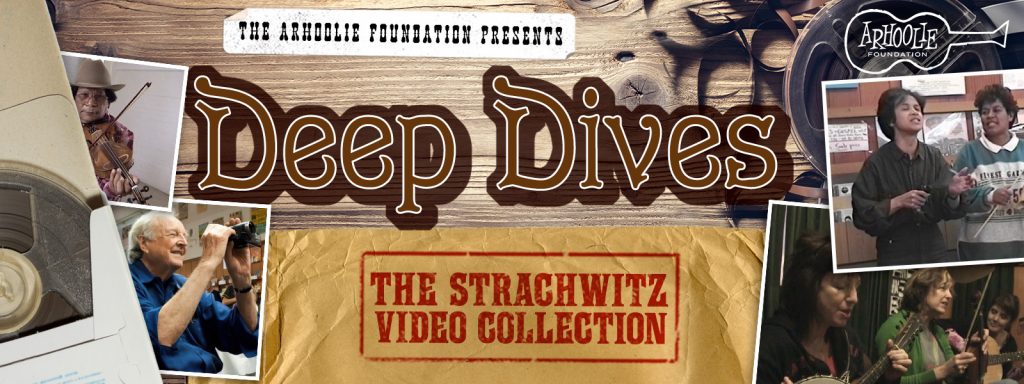
Chris Strachwitz spent many years taking pictures of the people, places and events that he was fortunate to be part of. In the 1980’s Chris also started taking more home movies and videos of concerts, parties, talks, and other behind-the-scenes activities. We have begun preserving over 700 hours of these videos. Some are on our website and YouTube channel. This week we will share new videos to enjoy.
Founded in 1995, the Magnolia Sisters recorded their first Arhoolie album as the duo Ann Savoy and Jane Vidrine. Subsequent albums added two more “sisters” — Lisa Trahan and Anya Burgess to form a rare all-female Cajun band. The group has always found vintage Cajun songs and made them into their own. Here they are appearing on “Panhandle Country” hosted by Arhoolie’s own Tom Diamant in 2010. They cover the 1959 Alex Broussard song, “Le Sud De La Louisiane” extolling the virtues of Louisiana living and eating.
In 1991-92 Henry Kaiser and David Lindley recorded and released “World Out Of Time, Volume 1” that featured the music of Madagascar, including two tracks by Tarika Sammy. Arhoolie Foundation Advisory Board member Elijah Wald wrote “Tarika Sammy are a sound man’s nightmare. Like a Malagasy New Lost City Ramblers, they change and rotate instruments constantly. All the instruments are acoustic, and the range of tone and timbre is extreme, from guitar to concertina to a two-sided box zither. And Tarika Sammy are not satisfied with a laid-back, folksy sound. To the non-Malagasy listener, Tarika Sammy’s music seems to have a strong African influence, suggesting Kenyan guitar styles and South African vocal harmonies. Hanitra (a member of the band), however, views “African music” as something completely foreign and different. “Our music is not at all African, except one song that we’ve just invented very recently,” she says.” Listen to this performance at Down Home Music in El Cerrito in 1997 and judge for yourself what it sounds like.
Benton Flippen was an innovator of a distinctive and driving style of old-time string music. He lived in Mt. Airy, NC and started playing the banjo in his early teens and picked up the fiddle when he was about eighteen years old. Benton’s fiddling style was known by unusual fingering patterns and his effective use of slides and a strong rhythmic bowing technique. “No point to sound just like the other man.” he said. “Don’t even try, ’cause you can’t. You got to sound like yourself, have your own style. That’s the way it’s supposed to be. It’s all creamed ‘taters, just fixed a little different.” Chris Strachwitz filmed him in 1996 at the Fiddle Tunes (Port Townsend, WA) with Paul Sutphin on guitar.

